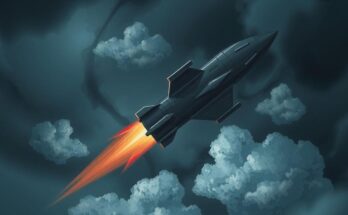Israel claims to have killed another Hezbollah leader amid its ongoing airstrikes, following the assassination of Hassan Nasrallah. Reports indicate significant casualties, with over 1,000 deaths in Lebanon, and a large number of civilians displaced. Iran has vowed retaliation for Nasrallah’s death, while the UK government urges its citizens to leave Lebanon. Amid these escalations, calls for diplomatic resolutions and concerns over further violence grow more pronounced.
Israel has reported the killing of another prominent Hezbollah leader amidst ongoing airstrikes on Lebanon, following the assassination of Hassan Nasrallah, Hezbollah’s 32-year leader. Sources have indicated that his body has been recovered from the debris intact. Over the weekend, Israeli operations resulted in at least fifteen fatalities in southern Lebanon, with the Israeli military claiming responsibility for the deaths of Nabil Kaouk, a significant Hezbollah figure, during their bombardments targeting arms manufacturing sites. Israeli strikes have reportedly caused the deaths of over 1,000 individuals, including women and children, according to local health authorities. In reaction to Nasrallah’s assassination, Iran’s supreme leader, Ali Khamenei, asserted that his death “will not go unavenged,” as he regarded Nasrallah as a significant figure in the regional resistance movement. Meanwhile, the UK government has urged its citizens to leave Lebanon immediately due to the escalating conflict. Editorial comments suggest that while the assassination may demoralize Hezbollah and its allies, it is unlikely to defeat the group’s ambitions or lead to lasting peace, echoing concerns about the potential for more extreme leadership emerging as a response to such targeted killings. Hezbollah has confirmed the death of another high-ranking member, Ali Karaki, who was reportedly killed alongside Nasrallah. Additionally, the Israeli military claims to have uncovered a lengthy Hamas tunnel in Gaza, which underscores the ongoing conflict in that region as well. Reports indicate significant displacement among the civilian population in Lebanon, with estimates suggesting that approximately 250,000 have fled their homes due to the fighting, exacerbated by heavy airstrikes. Furthermore, Lebanon’s caretaker Prime Minister Najib Mikati has stated that the country will pursue diplomatic avenues to respond to Israeli aggression. Amid the rising tensions, Israeli Prime Minister Benjamin Netanyahu warned of potential retaliatory actions, asserting that there is no location in the Middle East impervious to Israeli military operations. In Gaza, continuing Israeli airstrikes have resulted in additional fatalities, highlighting the widespread impact of the ongoing conflict in both Lebanon and Gaza.
The present conflict involves longstanding tensions between Israel and Hezbollah, which have historical roots dating back to Hezbollah’s formation in response to Israel’s invasion of Lebanon in 1982. Following a cycle of violence marked by numerous confrontations and assassinations, the assassination of Hezbollah leadership figures tends to provoke further hostilities rather than resolve underlying tensions. This pattern raises concerns about the potential for escalatory violence and the emergence of more extreme leaders within militant groups as a response to targeted killings. The current situation is characterized by significant civilian displacement and calls for international intervention and diplomatic resolutions amidst widespread fear of further conflict and instability in the region.
In summary, the assassination of Hezbollah leader Hassan Nasrallah has triggered a new wave of violence and retaliatory threats in the Israel-Lebanon conflict. Israel’s military actions have resulted in significant civilian casualties and displacement, prompting international calls for peace and stability. The complex historical context surrounding the ongoing hostilities highlights the challenges of achieving a lasting resolution, as targeted killings have often led to escalated violence and the emergence of more radical leadership. The situation remains precarious, with calls for diplomatic solutions, as the cycle of violence continues to threaten regional stability.
Original Source: www.independent.co.uk




